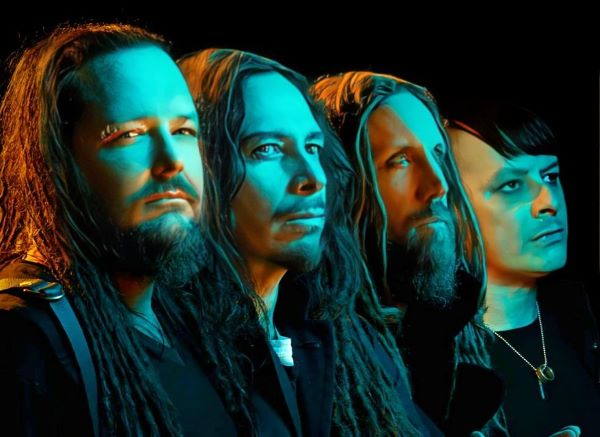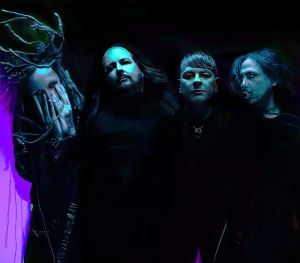How to Hire KORN For Your Event!
Members:
Jonathan Davis, James Shaffer, Reginald Arvizu, Brian Welch, Ray Luzier
Based in California
Hire Korn
GRAMMY award-winning Korn is an American nu-metal band formed in 1993 in Bakersfield, California. They are widely recognized as pioneers of the nu-metal genre, blending elements of heavy metal with hip-hop, alternative rock, and electronic music. Korn’s raw, aggressive sound, coupled with deeply emotional and often dark lyrics, has resonated with audiences worldwide.
Early Years and Formation
Korn was formed from the remnants of a band called L.A.P.D., which featured several future Korn members. The band’s lineup solidified in 1993 with Jonathan Davis (vocals), James “Munky” Shaffer (guitar), Brian “Head” Welch (guitar), Reginald “Fieldy” Arvizu (bass), and David Silveria (drums). Davis, who was working as a mortician at the time, was brought into the group after being spotted by Munky and Head while he was performing with his previous band, Sexart. Davis’s distinctive vocals, which mix melody with visceral growls and anguished screams, became a central part of Korn’s signature sound.
Self-Titled Debut Album (1994)
On October 11, 1994, Korn released a self-titled album through Immortal Records (an Epic imprint label) which peaked at number one on the Heatseekers Albums chart and would eventually reach number 72 on the Billboard 200 in February 1996.
The album featured a mix of downtuned seven-string guitars, groove-laden basslines, and a combination of raw emotion and aggressive soundscapes. Songs like “Blind,” “Shoots and Ladders,” and “Clown” became early anthems, and the album gained attention for its unorthodox approach to metal, combining dissonant riffs, hip-hop-inspired rhythms, and Davis’ intensely personal lyrics, often dealing with childhood trauma, abuse, and alienation. The album received positive reviews by critics, and it is said to have established the new wave of metal. The album also started record producer Ross Robinson’s music career. It also influenced other bands, such as Slipknot, Coal Chamber, and Limp Bizkit.
Despite receiving little mainstream radio play, Korn gained a massive underground following, largely through relentless touring and word-of-mouth. The band’s raw, cathartic energy and the unique blend of genres earned them a place as one of the frontrunners in the emerging nu-metal scene.
– Hire Korn for your festival or concert plans! – (t,s)
Breakthrough with Life Is Peachy and Follow the Leader
In 1996, Korn released their sophomore album, Life Is Peachy. While not as commercially successful as their later work, it still helped cement their status as a significant force in the metal world. The album’s songs, including “A.D.I.D.A.S.” and “No Place to Hide,” continued the band’s exploration of dark, personal themes.
A promotional disc was released in 1997 to promote both the band and the Life Is Peachy Tour featuring Incubus and the Urge and included three live tracks.
Korn gained more popularity after co-headlining the Lollapalooza summer tour festival in 1997 with Tool.
Their breakthrough came with their third album, Follow the Leader (1998), which propelled them into the mainstream. The album debuted at No. 1 on the Billboard 200, and its singles, including “Freak on a Leash” and “Got the Life,” received heavy rotation on MTV, helping to introduce Korn to a wider audience. Follow the Leader is often credited with bringing nu-metal into the mainstream and making Korn one of the most popular bands of the late 1990s.
Mainstream Success and Issues (1999)
Korn’s next album, Issues (1999), debuted at No. 1 on the Billboard 200 and further solidified their position as leaders in the metal scene. With singles like “Falling Away from Me” and “Make Me Bad,” the band continued to explore themes of mental anguish, personal demons, and internal struggles. The album’s release was a major event, with the band performing it in its entirety at New York City’s Apollo Theater, a venue traditionally reserved for African-American musicians, marking a milestone for the band.
Evolving Sound and Challenges
Throughout the early 2000s, Korn continued their success with albums like Untouchables (2002), Take a Look in the Mirror (2003), and See You on the Other Side (2005). During this period, the band’s sound evolved, incorporating more industrial and electronic elements, which alienated some fans but also attracted new listeners. Despite some criticisms, the band continued to enjoy commercial success, with their music charting high and their live performances drawing large crowds.
In 2005, Brian “Head” Welch left the band after converting to Christianity, citing the conflict between his faith and the rock lifestyle. This was a difficult time for the band, and it marked a significant shift in Korn’s sound and dynamic. Welch’s departure was followed by that of drummer David Silveria in 2006, leaving only three original members in the band.
Later Albums and Return of “Head”
In late 2010 and early 2011, Korn co-headlined the Music as a Weapon V tour with Disturbed. The tour also featured supporting acts Sevendust and In This Moment.
Korn continued as a four-piece and experimented with various sounds on albums like Korn III: Remember Who You Are (2010) and The Path of Totality (2011). The latter album saw them collaborating with dubstep artists such as Skrillex, blending heavy metal with electronic dance music, which further polarized their fanbase but kept the band at the forefront of innovation in rock music.
In 2013, Brian “Head” Welch rejoined Korn, and the band released The Paradigm Shift, which was seen as a return to form by many fans and critics alike. His return rejuvenated the band’s chemistry, and their subsequent albums, including The Serenity of Suffering (2016) and The Nothing (2019), saw Korn exploring darker, heavier themes while maintaining their core sound.
Legacy and Influence
On May 12, 2021, the band announced a 28-date summer US tour with Staind as the supporting act.
Korn has sold more than 40 million records worldwide and is considered one of the most influential metal bands of their generation. They are credited with popularizing nu-metal and bringing it into the mainstream during the late 1990s and early 2000s. Their willingness to experiment with different sounds, genres, and themes has earned them a reputation for innovation.
They are also known for their intense and emotional live performances, with Jonathan Davis often channeling his pain and struggles into powerful, cathartic displays. Korn‘s influence can be seen in a wide range of bands that emerged in the 2000s, from heavy metal acts to more alternative or experimental bands. Amy Lee of Evanescence cited Korn as an influence growing up.
The members of Korn are said to be influenced by Alice in Chains, Pantera, N.W.A, Bauhaus, Geto Boys, Van Halen, The Pharcyde, Nine Inch Nails, Deftones, and John Zorn.
Recent Activities
Korn continues to tour and record new music. Their 2022 album Requiem shows that the band still has a passion for pushing the boundaries of metal. The band’s music remains relevant to both new and old fans, maintaining their place as pioneers of modern heavy metal while continuing to evolve artistically.
Korn’s legacy as nu-metal forefathers, their emotionally charged lyrics, and their relentless innovation ensure their place as one of the most important bands in the heavy music world
#1. How do I book KoRn? See below.
Hire KoRn for your party or event!
#2. How much does it cost to book KoRn? See below.
KoRn may be available for your next special event!
#3. What is the KoRn booking fee? See below.
Book KoRn, now!
For other great suggestions regarding booking popular music acts and contact information, look here.
Watch KoRn Videos:
Upcoming Tour Dates for KoRn on Ticketmaster
- May 19, 2026 — Korn
Palacio de los Deportes, Ciudad de México, Ciudad de México
Buy Tickets - May 1, 2026 — KORN and SEPULTURA by Who Then Now? & NOMADS
The Georgian Theatre, Stockton-on-Tees, Stockton-on-Tees,
Buy Tickets - November 7, 2025 — Mechanical Animal [Nin Uk, Deaftones, Spouky Kids & Korn Again]
Queens Hall, Nuneaton,
Buy Tickets - December 6, 2025 — Mechanical Animal
Corporation, Sheffield,
Buy Tickets - December 12, 2025 — Mechanical Animal
Southampton 1865, Southampton,
Buy Tickets - December 13, 2025 — Mechanical Animal
Volks Club, Brighton,
Buy Tickets - December 19, 2025 — Mechanical Animal
Anarchy Brew Co, Newcastle Upon Tyne,
Buy Tickets
- Hire KoRn. -






